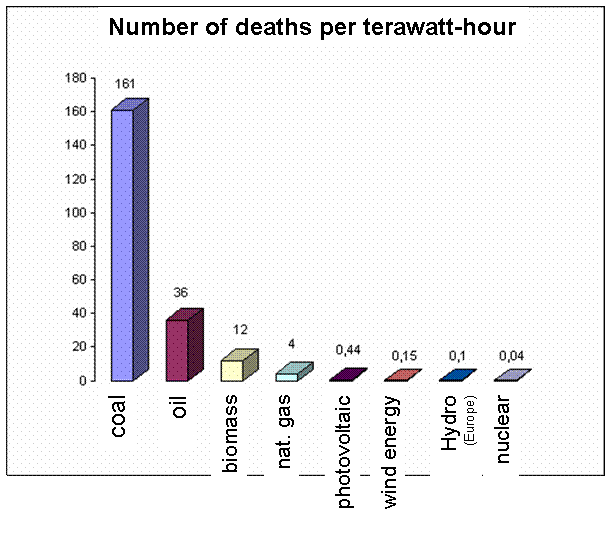Steffen Hentrich of the German liberal institute presents a comparison of the safety of various sources of energy. Much of the media, many politicians and a host of activists have all told us that nuclear energy is too dangerous to be used by man.
Is this claim founded on solid data and facts, or is it run-away hysteria? You be the judge. Shown are the number of deaths per terawatt-hour of energy produced.
Source: http://nextbigfuture.com/2011/03/lowering-deaths-per-terawatt-hour-for.html
By far, probably to James Hansen’s glee, coal, with its dangerous mining work, is the most dangerous of all. Surprisingly, even hydro, wind, and solar power are far more hazardous than nuclear.
Photovoltaic power generation kills, per terawatt-hour, 11 times more people than nuclear.
Using the arguments of the anti-nuclear activists, we can say there needs to be an immediate moratorium on windmills, photovoltaic panels and biomass plants. Compared to nuclear, they’re simply too deadly.
So what does all this mean? Hentrich writes:
With this in mind, nuclear energy alone becomes the scapegoat, and this illustrates the glaring denial of reality in politics and in the public. This also shows that a rapid stop of nuclear power generation will in no way reduce the risks involved in power generation.”
Indeed, stopping nuclear power makes the power generation industry much more dangerous, and not safer.






James Hansen, BTW, is on the record as being a nuclear proponent. In this case, he’s right for all the wrong reasons IMHO.
My favorite energy related danger-seeking pastime, forestry, probably would not fit in your graph… one has to cut a lot of timber to reach a TWh. Probably forestry is excluded because most of the wood is supposed to be used in construction. With the rising popularity of wood stoves and pellet heaters in Germany this is rapidly changing.
Right you are. I forgot to mention that. It’s the only thing he has ever gotten right at GISS.
German shipping companies avoid Tokyo harbor over radiation fears, Reuters says.
http://www.reuters.com/article/2011/03/24/us-japan-quake-ports-idUSTRE72N40420110324
Please note, this is not German news; i plucked it from the US Google News page.
I have never been able to fathom the anti-nuclear power movement. If one is to be injured or even killed by radiation it is likely to happen in a Dr’s office from a faulty X-Ray machine.
http://www.johnstonsarchive.net/nuclear/radevents/index.html
Believe it or not, the problems with the nuclear plants in Japan have prompted some of my neighbors to take Geiger counter readings and I live in the desert southwest of the US. Amazing. There is more radiation from bananas and Brazil nuts in these people’s houses.
Portugal’s government has abdicated; the prime minister could not get approval for an austerity package. Emergency EU summit is being held to inch out the details of the coming financial rescue package; Germany will contribute 22bn Euro.
Hmmm… one wonders, did Portugal miss out on the opportunity of Green Jobs? After all, they produce only 45% of their electricity in a “renewable” way…
http://en.wikipedia.org/wiki/Renewable_energy_in_Portugal
According to ecological canon, they should be running rings around us… what gives? 😉
They even had the worlds first commercial wave farm. Unfortunately, it closed down two months after opening; due to a problem with some of the bearings.
http://en.wikipedia.org/wiki/Agu%C3%A7adoura_Wave_Farm
“Following the money: The money follows
Climate planners are big on mottos. One of the favorites in Cochem-Zell is ‘Climate protection pays for itself.'”
brought to you by Deutsche Welle (a public broadcaster noone really listens to – talk radio, 100% party line (which party? Doesn’t matter, they’re all the same))
http://www.dw-world.de/dw/article/0,,14940855,00.html
I guess the Portoguese believed that…